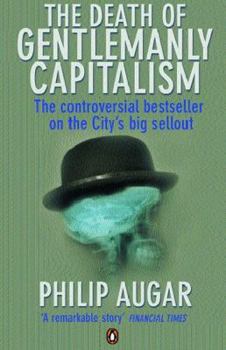The Death of Gentlemanly Capitalism: First Edition
Select Format
Select Condition 
Book Overview
This work will examines the decline of the British merchant bank during the 1980's and 90's. The story of Barings is commonly told, but Barings was just one of a significant number of British merchant banks which collapsed, were sold, or simply gave up. Only four now remain, and all of these survivors are independent of outside institutional shareholders. Phillip Augar takes us through the boom of the Thatcher years, the crash of 1987, the Big Bang and the impact of technology, and the aggressive invasion of the American banks. He looks at why the British banks failed to keep pace with these changes like their American counterparts, and what this says about the way they were run, and the way that companies in general are run. He also examines the issue of ownership and shareholding, which appear pertinent given that the four surviving British merchant banks are independent.
Format:Paperback
Language:English
ISBN:0140286683
ISBN13:9780140286687
Release Date:May 2005
Publisher:Penguin Global
Length:416 Pages
Weight:0.85 lbs.
Customer Reviews
1 rating
The Collapse of British Broking
Published by Thriftbooks.com User , 15 years ago
The City, London's financial district, is often described as being like the Wimbledon tennis tournament--held in London, staffed by locals, dominated by foreigners but still generating lots of prestige and money as well as jobs for the UK. Most City people say they don't mind that the district has become a "foreign affair". For them, ownership doesn't matter. "Show me a single statistic where the City is in decline", was how the governor of the Bank of England challenged the author to back up his argument. But Philip Augar, a former City executive turned consultant, begs to differ. He says ownership does matter, as it confers power and influence. He argues that the current situation, in which many leading British firms have sold out to foreign owners, has left the City with no control over its own destiny. He sees the absence of a single British-owned investment bank with meaningful global aspirations as a serious deficiency. And he argues that London's position as the leading secondary financial centre is not as secure as it appears. It may be unpopular to talk about national interest or national industry. But Augar's book raises the question of whether it is all right, in the name of globalization and market principles, to allow a nation's key industry to fall under the domination of foreign powers. For him, the analogy with the Wimbledon tournament is flawed: "Wimbledon is British owned, the performers are foreign; the City is foreign owned, the performers are British. Ownership brings control and it is the City's lack of control over its own destiny that creates concern." Meanwhile, financial institutions and multinational firms have not become stateless entities. "Ask any London employee of Merrill Lynch or Goldman, or UBS or Dresdner Bank the nationality of the company they work for and you do not have long to wait for an answer. As we have seen in manufacturing industry, head office determines the strategy, the culture and the commitment." Before the Big Bang reforms of the last half of the 1980s, the City was a simple, inward-looking world where everybody knew everybody. Most of the products handled were British. On the market floor, those who did not play by the rules were ostracized. The sense of family was cultivated by the partnership structure of most broking firms and merchant banks. Real time computer models, even spreadsheets, were years away. Notebooks, ledgers, and the backs of envelopes were more common risk-management tools. Broking was held to be a flair business which too much management would stifle. Appraisals, formal targets and training for staff were still in their infancy. Basic administrative skills were also in short supply so that record keeping and process--dismissed as red tape in the smaller partnerships--were not part of the prevailing culture. Elements of a class system were also predominant. "Everything from the way people dressed, spoke and ate to the buildings and rooms in which they worked was der






